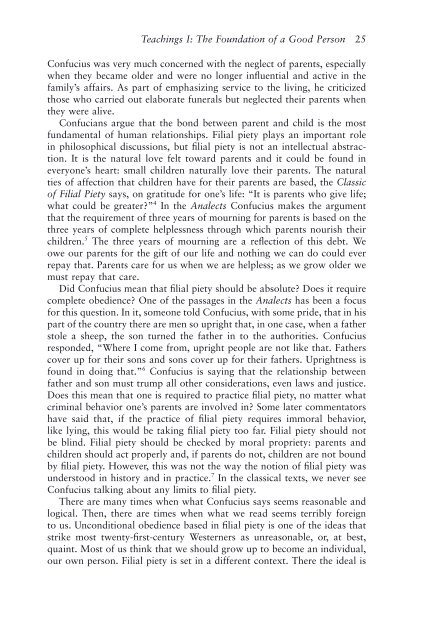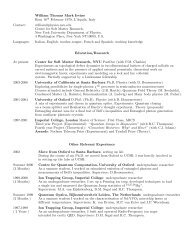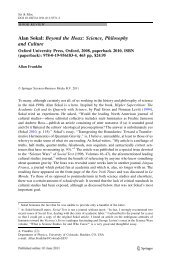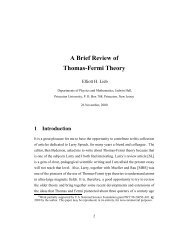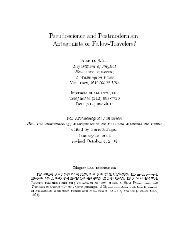Good Confucianism book (pdf) - Department of Physics
Good Confucianism book (pdf) - Department of Physics
Good Confucianism book (pdf) - Department of Physics
Create successful ePaper yourself
Turn your PDF publications into a flip-book with our unique Google optimized e-Paper software.
Teachings I: The Foundation <strong>of</strong> a <strong>Good</strong> Person 25Confucius was very much concerned with the neglect <strong>of</strong> parents, especiallywhen they became older and were no longer influential and active in thefamily ’ s affairs. As part <strong>of</strong> emphasizing service to the living, he criticizedthose who carried out elaborate funerals but neglected their parents whenthey were alive.Confucians argue that the bond between parent and child is the mostfundamental <strong>of</strong> human relationships. Filial piety plays an important rolein philosophical discussions, but filial piety is not an intellectual abstraction.It is the natural love felt toward parents and it could be found ineveryone ’ s heart: small children naturally love their parents. The naturalties <strong>of</strong> affection that children have for their parents are based, the Classic<strong>of</strong> Filial Piety says, on gratitude for one ’ s life: “ It is parents who give life;what could be greater? ” 4 In the Analects Confucius makes the argumentthat the requirement <strong>of</strong> three years <strong>of</strong> mourning for parents is based on thethree years <strong>of</strong> complete helplessness through which parents nourish theirchildren. 5 The three years <strong>of</strong> mourning are a reflection <strong>of</strong> this debt. Weowe our parents for the gift <strong>of</strong> our life and nothing we can do could everrepay that. Parents care for us when we are helpless; as we grow older wemust repay that care.Did Confucius mean that filial piety should be absolute? Does it requirecomplete obedience? One <strong>of</strong> the passages in the Analects has been a focusfor this question. In it, someone told Confucius, with some pride, that in hispart <strong>of</strong> the country there are men so upright that, in one case, when a fatherstole a sheep, the son turned the father in to the authorities. Confuciusresponded, “ Where I come from, upright people are not like that. Fatherscover up for their sons and sons cover up for their fathers. Uprightness isfound in doing that. ” 6 Confucius is saying that the relationship betweenfather and son must trump all other considerations, even laws and justice.Does this mean that one is required to practice filial piety, no matter whatcriminal behavior one ’ s parents are involved in? Some later commentatorshave said that, if the practice <strong>of</strong> filial piety requires immoral behavior,like lying, this would be taking filial piety too far. Filial piety should notbe blind. Filial piety should be checked by moral propriety: parents andchildren should act properly and, if parents do not, children are not boundby filial piety. However, this was not the way the notion <strong>of</strong> filial piety wasunderstood in history and in practice. 7 In the classical texts, we never seeConfucius talking about any limits to filial piety.There are many times when what Confucius says seems reasonable andlogical. Then, there are times when what we read seems terribly foreignto us. Unconditional obedience based in filial piety is one <strong>of</strong> the ideas thatstrike most twenty - first - century Westerners as unreasonable, or, at best,quaint. Most <strong>of</strong> us think that we should grow up to become an individual,our own person. Filial piety is set in a different context. There the ideal is


